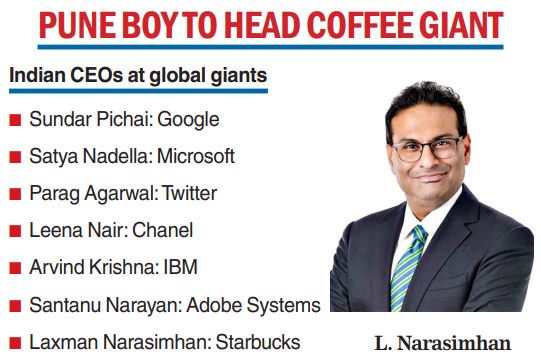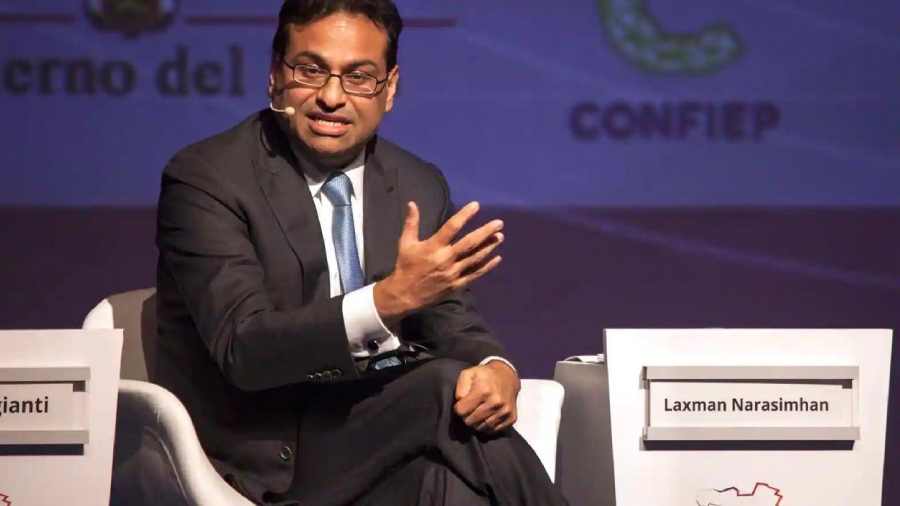Yet another global firm will have an Indian-origin CEO: beverage giant Starbucks appointed Laxman Narasimhan as its next chief executive late on Thursday, hours after the Reckitt Benckiser group unexpectedly announced he will step down as its CEO on September 30.
Narasimhan will join the likes of Sundar Pichai at Google), Satya Nadella, Microsoft, Parag Agarwal, Twitter, Leena Nair, Chanel, Arvind Krishna, IBM, and Santanu Narayen at Adobe) who head global corporations. A Starbucks statement said Narasimhan will join the company as incoming CEO on October 1 and will work closely with Howard Schultz, interim CEO, before taking up the reins from April 1. Narasimhan is a mechanical engineer from the College of Engineering, Pune and a finance MBA from The Wharton School of The University of Pennsylvania.

Narasimhan will head the world’s largest coffee chain as it grapples with a growing unionisation movement, rising inflation and losses in China. He will take over from Schultz, Starbucks’s longtime leader, who took back the reins of the company last April after Kevin Johnson stepped down as chief executive. “We were looking for somebody that was a true servant leader that had a deep sense of humility,” Schultz said in an interview.
“Laxman first and foremost is a true servant leader.” Narasimhan, 55, will be thrust into one of the world’s most prominent corporate leadership roles, overseeing roughly 35,000 stores and 383,000 employees globally.
A former senior PepsiCo executive, he has most recently led Reckitt Benckiser, the British conglomerate that makes Lysol disinfectant and Durex condoms. Born in Pune, Narasimhan moved to the United States in 1991 to attend the Wharton School. He then joined the consulting giant McKinsey & Com pany, eventually becoming a senior partner.
In 2012, he moved to PepsiCo, where he rose through the ranks, overseeing operations in Latin America, Europe and sub-Saharan Africa, and becoming chief commercial officer. He was hired at Reckitt in 2019 to revive the conglomerate, which had been burdened by the $16.6 billion takeover of the infant products maker Mead Johnson and an ill-fated move to split the company.
He drew praise from investors and analysts for selling underperforming operations and steering the company through the pandemic. Shares in Reckitt fell more than 5 per cent on Thursday after the company unexpectedly announced that Narasimhan would step down as its chief executive on September 30 — explaining only that he “has been approached for an opportunity that enables him to live” in the United States.
He had been looking for a job that would return him to the United States, where his two adult children live. It was his breadth of experience across industries and international borders that drew Starbucks to Narasimhan. “He’s a true operator and has the DNA of an entrepreneur,” Schultz said, adding that his background in technology and supply chains would be invaluable to the company.
Schultz is expected to remain the company’s interim chief executive until April, and then become an adviser to Narasimhan. Schultz will remain on the company’s board as well. In Starbucks’s most recent earnings report, in August, Schultz spoke of the company’s early progress in reinventing itself — a task that will now fall to Narasimhan.
Narasimhan will join the company in October, Schultz said, spending the next several months getting “immersed” in the culture of Starbucks, traveling to stores around the world and even working behind the counter at some before officially taking over. “He will make us better,” Schultz said.
(With inputs from NYTNS)











